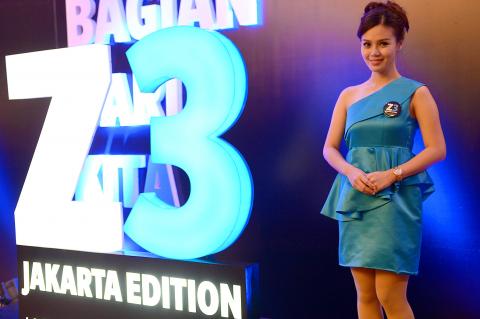BlackBerry Ltd launched a low-cost touch screen device in Jakarta, the Z3, as the embattled smartphone maker looks to revive sales in emerging markets like Indonesia, where its once-fervent following has shriveled.
The handset, unveiled at a glitzy launch event in the Indonesian capital on Tuesday, is the first in a line of devices being made with FIH Mobile Ltd (富智康), a unit of the giant Foxconn Technology Group (富士康科技集團) best known for assembling gadgets like iPhones and iPads for Apple Inc.
The success of the handset retailing for less than US$200 could well decide the outcome of both BlackBerry’s tie-up with the contract manufacturing giant and its own future in smartphones.

Photo: AFP
The Z3 Jakarta Edition will hit store shelves tomorrow. It is the first phone to be launched by BlackBerry since new chief executive John Chen (程守宗) took the helm late last year.
It is initially being launched in Indonesia, but will be gradually introduced in other markets as well.
Waterloo, Ontario-based BlackBerry hopes that the device and others to follow will help it claw back some of the collapse in its market share, ceded to Apple’s iPhone and Samsung Electronics Co’s line of Galaxy devices powered by Google Inc’s Android operating system.
“If the market doesn’t receive this product well, then we definitely have some negative issues to deal with,” Chen said at the launch at Jakarta’s Ritz-Carlton hotel.
Just two years ago, the Canadian firm had a 40 percent share of the Indonesian market, shipping more than 600,000 handsets per quarter in a country once known as “BlackBerry Nation.”
The launch of the premium, high-priced BlackBerry 10 last year failed to attract buyers in a country where nearly 40 percent of the population live on about US$2 a day. Indonesia is now dominated by Samsung, which sells about one of every three smartphones in Southeast Asia’s largest economy.
Chen hopes that the Z3 and other devices to follow spark a change in the company’s fortunes. The Z3 is being launched at a price point below US$200 to address one of the big turnoffs for consumers in emerging markets — BlackBerry 10 devices being too pricey.
“From conception to delivery, the BlackBerry Z3 Jakarta Edition was designed specifically with Indonesian customers in mind,” Chen said in a statement.
The device will allow users to type in Bahasa and come with a special set of BlackBerry Messenger, or BBM Stickers featuring local characters.
Later this year, BlackBerry will launch a new, non-touchscreen device dubbed the BlackBerry Classic in partnership with Foxconn. The handset will see a return of the command keys that include “Menu,” “Back,” “Send” and “End” buttons, along with a trackpad. BlackBerry hopes the move will address the concerns of those users who found their new devices hard to navigate.
For Foxconn, the tie-up fits with plans to set up a manufacturing plant in Indonesia to build smartphones and other electronic devices. The Taiwanese company’s ambitions have been on hold for years due to drawn-out talks over tax breaks, property and import restrictions.

Anna Bhobho, a 31-year-old housewife from rural Zimbabwe, was once a silent observer in her home, excluded from financial and family decisionmaking in the deeply patriarchal society. Today, she is a driver of change in her village, thanks to an electric tricycle she owns. In many parts of rural sub-Saharan Africa, women have long been excluded from mainstream economic activities such as operating public transportation. However, three-wheelers powered by green energy are reversing that trend, offering financial opportunities and a newfound sense of importance. “My husband now looks up to me to take care of a large chunk of expenses,

SECTOR LEADER: TSMC can increase capacity by as much as 20 percent or more in the advanced node part of the foundry market by 2030, an analyst said Taiwan Semiconductor Manufacturing Co (TSMC, 台積電) is expected to lead its peers in the advanced 2-nanometer process technology, despite competition from Samsung Electronics Co and Intel Corp, TrendForce Corp analyst Joanne Chiao (喬安) said. TSMC’s sophisticated products and its large production scale are expected to allow the company to continue dominating the global 2-nanometer process market this year, Chiao said. The world’s largest contract chipmaker is scheduled to begin mass production of chips made on the 2-nanometer process in its Hsinchu fab in the second half of this year. It would also hold a ceremony on Monday next week to

TECH CLUSTER: The US company’s new office is in the Shalun Smart Green Energy Science City, a new AI industry base and cybersecurity hub in southern Taiwan US chip designer Advanced Micro Devices Inc (AMD) yesterday launched an office in Tainan’s Gueiren District (歸仁), marking a significant milestone in the development of southern Taiwan’s artificial intelligence (AI) industry, the Tainan City Government said in a statement. AMD Taiwan general manager Vincent Chern (陳民皓) presided over the opening ceremony for the company’s new office at the Shalun Smart Green Energy Science City (沙崙智慧綠能科學城), a new AI industry base and cybersecurity hub in southern Taiwan. Facilities in the new office include an information processing center, and a research and development (R&D) center, the Tainan Economic Development Bureau said. The Ministry

State-run CPC Corp, Taiwan (CPC, 台灣中油) yesterday signed a letter of intent with Alaska Gasline Development Corp (AGDC), expressing an interest to buy liquefied natural gas (LNG) and invest in the latter’s Alaska LNG project, the Ministry of Economic Affairs said in a statement. Under the agreement, CPC is to participate in the project’s upstream gas investment to secure stable energy resources for Taiwan, the ministry said. The Alaska LNG project is jointly promoted by AGDC and major developer Glenfarne Group LLC, as Alaska plans to export up to 20 million tonnes of LNG annually from 2031. It involves constructing an 1,290km